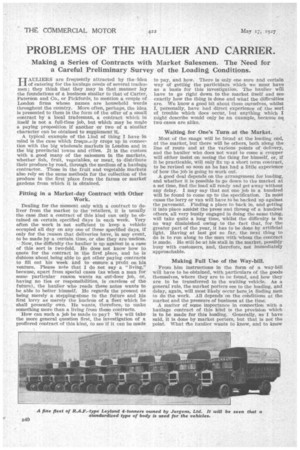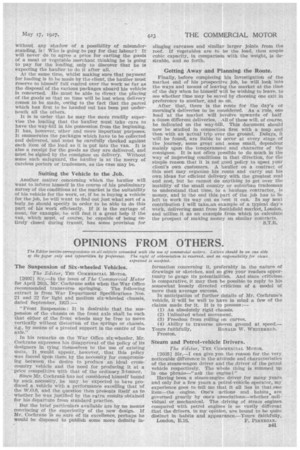PROBLEMS OF THE HAULIER AND CARRIER.
Page 58

Page 59

If you've noticed an error in this article please click here to report it so we can fix it.
Making a Series of Contracts with Market Salesmen. The Need for a Careful Preliminary Survey of the Loading Conditions.
TTAULIERS are frequently attracted by the ,idea J. I of catering for the haulage needs of several tradesmen; they think that they may in that manner lay the foundations of a business similar to that of Carter, Paterion and Co., or Pickfords, to mention a couple of London firms whose names are household words throughout the country. More often, perhaps, the idea is presented to them in the form of the offer of a small contract by a local tradesman, a contract which in itself is not a full-time job, but which may be inasle a paying proposition if another or two of a similar character can be obtained to supplement it.
A_ typical example of the Lind of thing I have in mind is the ease which freqm.,,:ly crops up in connection with the big wholesale markets in London and in the big provincial towns and cities. It is the custom with a good many of the salesmen in the markets, whether fish, fruit, vegetables, or meat, to distribute their produce by road, through the medium of a haulagq, contractor. Those in the fruit and vegetable markets also rely en the same methods for the collection of the produce in the first place from the farms or market gardens from which it is obtained.
Fitting in a Market-day Contract with Other Work.
Dealing for the moment only with a contract to deliver from the market to the retailers, it is usually the case that a contract of this kind can only be obtained on certain specified days in each week. Very often the work is not sufficient to keep a vehicle occupied all day on any one of these specified days, if only for the reason that deliveries have, in any event, to be made by a certain time, or else they are useless.
Now, the difficulty the haulier is up against in a case of this sort is two-fold. He does not know how to quote for the contract in the first place, and he is dubious about, being able to get other paying contracts to fill out his week and to ensure a profit on hia venture. Please note that I do not say a "living," because, apart from special cases (as when a man for some particular reason wants an out-door job, or, having no ties or responsibilities, is careless of the future), the haulier who reads these notes wants to be able to better himself. He regards the present as being merely a stepping-stone to the future and his first lorry as merely the hucleus of a fleet which he shall presently own. He wants, therefore, to make something more than a living from these contracts.
How can such a job be made to pay? We will take the more general question first, the investigation of a proffered contract of this kind, to see if it can be made to pay, and how. There is only one sure and certain way of getting the particulars which we must have as a basis for this investigation. The haulier will have to go right down to the market itself and see exactly how the thing is done and what the difficulties are. We know a good bit about them ourselves, whilst I, personally, have had direct experience of the sort of trouble which does occur, but anything which might describe would only be an example, because no two cases are alike.
Waiting for One's Turn at the Market.
Most of the snags will be found at the loading end, at the market, but there will be others, both along the line of route and at the various points of delivery, and the haulier who does not want to come a cropper will either insist on seeing the thing for himself, or, if it be practicable, will only fix up a short term contract, to be revised so soon as he has had a little experience of how .the job is going to work out. .
A good deal depends on the arrangement for loading, and whether it is possible to go down to the market at a set time, find the load an ready and get away without any delay. I may say that not one job in a hundred will be found to come up to the specification. In most cases the lorry or van will have to be backed up against the pavement. Finding a place to back in, and getting it into place amidst the press and throng of a hundred others, all very busily engaged in doing the same thing, will take quite a long time, whilst the difficulty is in no way diminished owing to the fact that, for the greater part of the year, it has to be done by artificial light. Having at last got so far, the next thingto do is to run along to the man with 'whom the contract is made. He will be at his stall in the market, possibly busy with customers, and, therefore, not immediately approachable.
Making Full Use of the Way-bill.
From him instructions in the form of a way-bill will have to be obtained, with particulars of the goods themselves, where they are to be found, and how they are to be transferred to the waiting vehicle. As a general rule, the market porters see to the loading, and delay, again, will most likely occur here ill finding men to do the work. All depends on the conditions at the market and the pressure of business at the time.
A matter of some importance in connection With .a haulage contract of this kind is the provision which is to be made for this loading. Generally, as I have said, it is done by market porters, but that is not the point. What lie haulier wants to know, and to know without any shadow of a passibility of misunderstanding, is f Who is going to pay for that labour? It will never do to agree a price for carting the goods of a meat or vegetable merchant thinking he is going to pay for the loading, only to discover that he is expecting the haulier to do it after all.
At the same time, whilst making sure that payment for loading.is to be made by the client, the haulier must reserve to himself full coutrol over the work so far as the disposal of the various packages aboard his vehicle is concerned. He must be able to direct the placing of the goods so that no time will be lost when delivery comes. to be made, owing to the fact that the .parcel which has first to be handed out has been put underneath all the others.
It is in order that he may the more readily superVise the loading that the haulier must take care to have the way-bill in his possession from the beginning. It has, however, other and more important purposes. It enumerates the packages which have to be collected and delivered, and must be carefully checked against each item of the load as it is put into the van. It is also a receipt for the goods as they are delivered, and must be signed by the consignee on delivery. Without Some such safeguard, the haulier is at the mercy of careless porters or tradesmen, as the case may be.
Suiting the Vehicle to the Job.
Another matter concerning which the haulier will want to inform himself in the course of his preliminary survey of the conditions at the market is the suitability of his vehicle for the work, or, if lie is buying a vehicle for the job, he will want to find out just what sort of a body he Should specify in order to be able to do this part of his work efficiently. If it is the cartage of. meat, for example, he will find it a great help if the van, which must, of course, be capable of being entirely closed during transit, has some provision for slinging carcases and similar larger joints from the roof. If Vegetables are to be the load, then ample cubic capacity, in comparison with the weight, is desirable, and so forth.
Getting Away and Planning. the Route.
Finally, before completing his investigation of the market end of his prospective job, he will look into the ways and means of leaving the market at the time of the day when he himself will be wishing to leave, to see whether time may be saved by choosing one exit in preference to another, and so on.
After that, there is the route for the day's or morning's deliveries to be considered. As a rule, one load 'at the market will involve upwards of half a dozen different deliveries. All of these will, of course, be indicated on the way-bill. This document should now be studied in connection first with a map and then with an actual trip over the ground. Delays, it 'will be found, are liable to occur at every stage of the journey, some great and some small, dependent mainly upon the temperament and character of the consignee. It is not often possible to do much in the way of improving conditions in that direction, for the simple reason that it is not good policy to upset your client's own customers. A haulier on a contract of this sort may organize his route and carry out his own ideas for efficient delivery with the greatest zeal and zest, but he cannot do anything to get over the inability of the small country or suburban tradesman to understand that time, to a haulage contractor, is money, and in the end this part of the job has to he left to work its way out as hest it can. In my next contribution I will take.an example of a typical day's work, delivering meat from Smithfield market, London, and utiliz,e it as an example from which to calculate the prospect of making money on similar contracts.




































































































